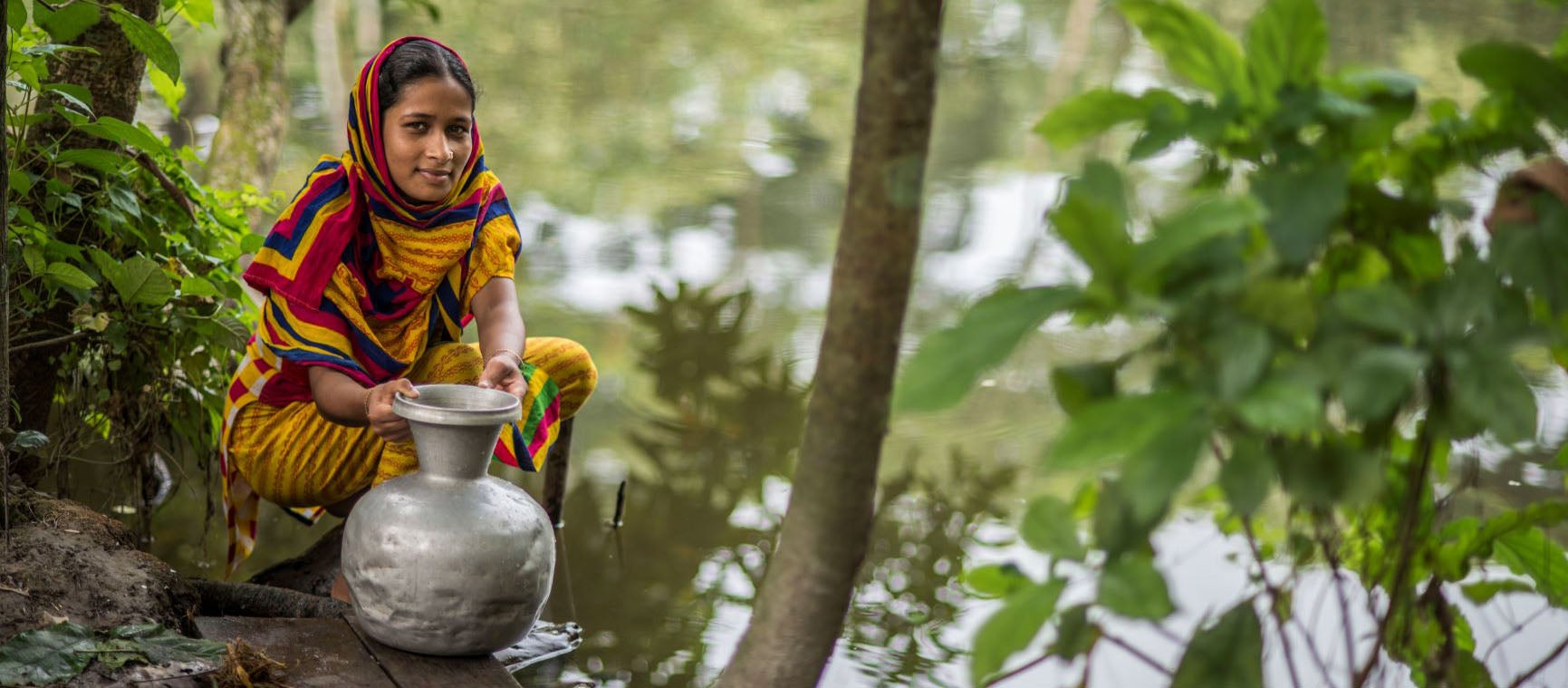 The distance women and girls travel to collect water takes up precious time that could be spent on education and income earning activities. Photo: World Bank
The distance women and girls travel to collect water takes up precious time that could be spent on education and income earning activities. Photo: World Bank
“Sometimes we drink rainwater, other times water from the pond,” says Masuma Begum. “We boil it if we can but don’t always have time. There is no deep tube well near our home, no pipe water, no other options for us. My children are often sick and weak. We are too poor to invest in a well.”
Masuma, who lives in the port city of Chattogram, is one among many in Bangladesh who struggle daily with water, sanitation, and hygiene (WASH) issues- women like her, more so than men. Women and girls bear 90 percent of the responsibility of collecting water in Bangladesh. The distance women and girls travel to collect water takes up precious time that could be spent on education and income earning activities. Studies from some countries find that the lack of WASH facilities in or in proximity to homes, coupled with social norms that justify gender-based violence (GBV), exposes females to higher risk of GBV while walking long distances to secure water and using remote and unsafe sanitation facilities. Families lacking safe drinking water fall ill more often, and the responsibility of caring for sick family members falls on women too. Additionally, the lack of secure gender-segregated toilets in schools, health care facilities, markets and workplaces limits women’s access to these services makes it a challenge for women and girls to access services.
Women’s voice in water governance is critical for inclusive policies that benefit both women and men and support the sustainability of water resources
Challenges
Women struggle with WASH for several reasons. Firstly, their knowledge about their own health remains weak, and poor menstrual hygiene practices have adverse effects on women and girls’ health and education. Only 23 percent of women use appropriate menstrual materials. Social misunderstanding about menstruation causes other complications and restrictions. Seventy-four percent of students believe that going out, cooking, and eating certain foods are forbidden during menstruation. Only 6 percent of schools provide menstrual health and hygiene education.
Secondly, women’s WASH-related decision-making is low as their participation in water governance is constrained by a range of factors. WASH-related decision-making is dominated by men. In southwest Bangladesh, women constitute only 20 percent of representatives in water management organizations, and none in positions such as president or treasurer. Evidence from different countries shows that even when women are included as members, they often do not participate in a meaningful way due to power imbalance. They either do not attend meetings, and when they do, they tend to sit in the back and speak less than men, because they don’t think their opinion matters, they are afraid to make mistakes and they don’t want to undermine male family members.
Women’s employment in WASH also remains low. A recent World Bank report “Women in Water Utilities: Breaking Barriers, finds that women comprise only 6percent of employees in water and sanitation utilities in Bangladesh. Even fewer women work as entrepreneurs. Female-owned enterprises are more likely than their male counterparts to be small, informal, and home-based. Women face greater challenge accessing finance, markets, technology, and networks. In Bangladesh, 60.2 percent of Bangladeshi female entrepreneurs’ say demand for finance is unmet.
A New Pathway
Issues of water scarcity are gaining increased attention in global debates. According to the 2021 edition of the United Nations World Water Development Report (UN WWDR 2021) entitled ‘Valuing Water,’ the world will face a 40 percent global water shortage by 2030 if current water usage trends don’t change. Women’s voice in water governance is critical for inclusive policies that benefit both women and men and support the sustainability of water resources. Women play critical roles in influencing the ways in which households and communities use and conserve water. As decision-makers, women often invest more in human capital and on issues of concern to women such as access to clean drinking water, and water control and harvesting. Studies find that women’s participation in water user associations results in better enforcement of rules, collection of fees, and conflict management and resolution. There is also some evidence that marginalized women find it easier to approach female decision-makers than their male counterparts if they are facing issues related to water.
To address gender inequalities in the WASH sector, the Government of Bangladesh and the World initiated, the Bangladesh Rural WASH for Human Capital Development. The project will empower women and girls like Masuma by providing improved access to water, sanitation and hygiene services in 78 rural sub-districts in Bangladesh.
The project will give women access to microfinance loans and sanitation grants for investment in household WASH facilities. Those who are extremely poor will receive grants rather than loans. It will also sensitize women on the importance of ‘safely managed’ WASH facilities and educate them on menstrual hygiene through credit group sessions and home visits by local entrepreneurs. This will help shift WASH decision-making from men in town markets to women in homes.
At the community level, the project will promote women’s representation and leadership in water management committees, with a target of women chairing 30 percent of these committees . These women will be trained and supported to raise their voices around WASH issues. It will also facilitate access to finance to 150 women entrepreneurs to help them market and sell soaps, disinfectants and menstrual hygiene products at household doorsteps, improving menstrual hygiene practices, especially among adolescent girls who are shy to purchase them from the market.
Insights gained from The Rising Tide: A New Look at Water and Gender show that access to vital resources is more critical than ever, but the question remains, how do we bring all stakeholders together.





Join the Conversation